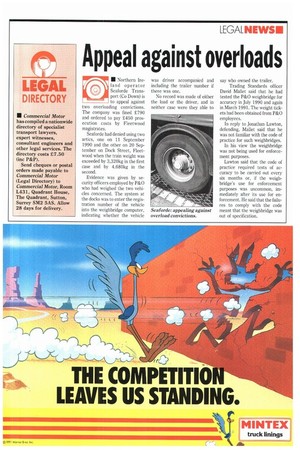Appeal against overloads
Page 17

If you've noticed an error in this article please click here to report it so we can fix it.
• Northern Ireland operator Seaforde Transport (Co Down) is to appeal against two overloading convictions. The company was fined £790 and ordered to pay £450 prosecution costs by Fleetwood magistrates.
Seaforde had denied using two artics, one on 11 September 1990 and the other on 20 September on Dock Street, Fleetwood when the train weight was exceeded by 3,320kg in the first case and by 4,680kg in the second.
Evidence was given by security officers employed by P&O who had weighed the two vehicles concerned. The system at the docks was to enter the registration number of the vehicle into the weighbridge computer, indicating whether the vehicle
was driver accompanied and including the trailer number if there was one.
No record was made of either the load or the driver, and in neither case were they able to say who owned the trailer.
Trading Standards officer David Mallet said that he had tested the P&O weighbridge for accuracy in July 1990 and again in March 1991. The weight tickets had been obtained from P&O employees.
In reply to Jonathan Lawton, defending, Mallet said that he was not familiar with the code of practice for such weighbridges.
In his view the weighbridge was not being used for enforcement purposes.
Lawton said that the code of practice required tests of accuracy to be carried out every six months or, if the weighbridge's use for enforcement purposes was uncommon, immediately after its use for enforcement. He said that the failures to comply with the code meant that the weighbridge was out of specification.




























































































